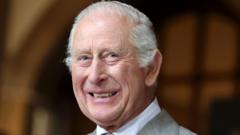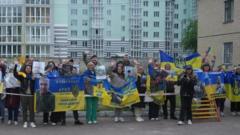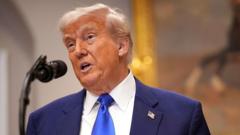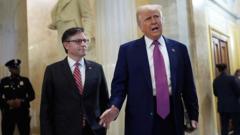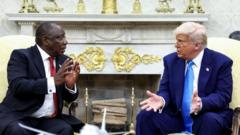As diplomatic talks unfold, Russia appears more confident while making no substantial commitments to peace in Ukraine amidst ongoing conflict.
Kremlin Confidence Grows Despite Stalemate in Ukraine Peace Efforts
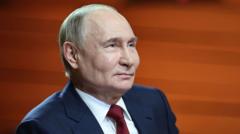
Kremlin Confidence Grows Despite Stalemate in Ukraine Peace Efforts
Despite a flurry of diplomatic activity, peace in Ukraine seems distant as Russia sidesteps calls for a ceasefire.
Inside the Kremlin walls at 2:30 AM, I wandered through the expansive grounds, trying unsuccessfully to find an exit. After showing my passport at a checkpoint and hearing the guard say, “Nyet vykhoda!” ["No exit!"], I felt lost. Many would describe my experience as something out of a John le Carré novel. The evening had started at 5 PM with the promise of an event featuring President Vladimir Putin, but instead of a press conference with questions, I witnessed a live televised statement. Putin proposed direct talks between Russia and Ukraine in Istanbul.
This night marked the beginning of an eventful two weeks that included peace talks in Turkey and a two-hour call between Putin and Donald Trump. Despite the high-profile dialogues, a resolution in Ukraine feels elusive. The discussions have primarily remained abstract, with no commitment from Russia to an unconditional ceasefire, nor any intention to relinquish territory it occupies.
Throughout the past fortnight, each action taken by Russia showed how adept it is at neutralizing pressure and navigating potential threats. On 10 May, just hours before my fateful venture through the Kremlin, European leaders issued an ultimatum: agree to a ceasefire or face severe sanctions. While Ukraine concurred, Moscow did not. Instead, Putin’s counteroffer of direct talks managed to stall punitive measures, giving Russia more time to strategize.
At the meeting in Istanbul on 16 May, expectations were subverted once more as Putin did not attend; instead, he sent a lower-level delegation to reiterate Russia's unwillingness to agree to a ceasefire. However, the discussions, even if yielding little, appeared satisfactory to Trump, who believed they signaled progress.
Post-telephone call on 19 May, Trump expressed optimism regarding negotiations for a ceasefire and potential cessation of hostilities, yet Russia continued to cast doubt on signing a peace treaty with Ukrainian President Volodymyr Zelensky. Lavrov even hinted that legitimacy issues surrounding Zelensky must be addressed before any agreement.
In Russian media, the recent diplomatic efforts have been portrayed as advantageous to Moscow, with assertions that Trump’s approach supports Russia's position of "Talks first, ceasefire later." Analysts noted that Trump's views are aligning more closely with Russia's than those of European nations.
Underlining Moscow's confidence is its perception of an advantage in the ongoing battlefield situation in Ukraine. Despite Trump's past pledges to resolve the conflict swiftly, the war continues without resolution. He has occasionally reprimanded the Kremlin but has shown reluctance to escalate pressure, leading to speculation about his true intentions regarding US-Russia relations.
As the diplomatic chess game plays out with little promise of peace in sight, Russia seems poised to continue its strategic maneuvering, comfortable with its current standing despite the disarray in efforts to establish peace in Ukraine.



